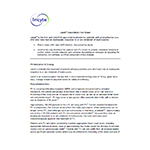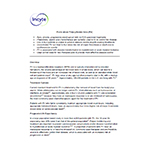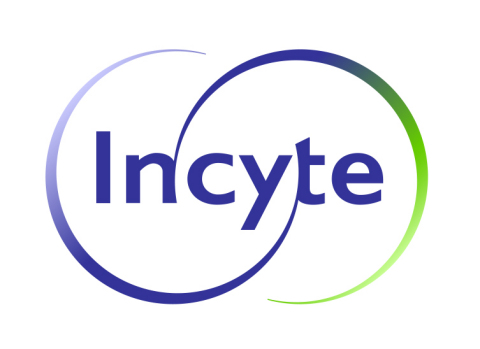WILMINGTON, Del.--(BUSINESS WIRE)--Incyte Corporation (Nasdaq: INCY) today announced that the U.S. Food and Drug Administration (FDA) has approved Jakafi® (ruxolitinib) for the treatment of patients with polycythemia vera (PV) who have had an inadequate response to or are intolerant of hydroxyurea. Jakafi, an oral medication, is the first and only product approved by the FDA for PV, a rare and progressive blood cancer1.
“The approval of Jakafi represents an important advance for patients with uncontrolled PV. For the first time we are able to provide these patients a treatment that has been shown to provide effective and consistent control of their blood counts and reduce spleen volume,” said Srdan Verstovsek, M.D., Ph.D., Professor, Department of Leukemia, Division of Cancer Medicine, The University of Texas MD Anderson Cancer Center.
PV is a myeloproliferative neoplasm (MPN) and is typically characterized by elevated hematocrit, the volume percentage of red blood cells in whole blood, which can lead to a thickening of the blood and an increased risk of blood clots, as well as an elevated white blood cell and platelet count1. PV may occur at any age but often presents later in life, with a median age at diagnosis of 60 years1,2.
Approximately 100,000 patients in the U.S. are living with PV3. Current standard treatment for PV is phlebotomy (the removal of blood from the body) plus aspirin. When phlebotomy can no longer control PV, chemotherapy such as hydroxyurea, or interferon, is utilized4,5. Approximately one in four (~25,000) patients with PV are considered uncontrolled6,7 because they have an inadequate response to or are intolerant of hydroxyurea, the most commonly used chemotherapeutic agent for the treatment of PV.
Patients with PV who fail to consistently maintain appropriate blood count levels, including appropriate hematocrit levels, have an approximately four times higher risk of major thrombosis (blood clots) or cardiovascular death8. Patients with PV can also suffer from an enlarged spleen, and a significant symptom burden which may be attributed to thickening of the blood and a lack of oxygen to parts of the body9. These symptoms commonly include fatigue, itching, night sweats, bone pain, fever, and weight loss5.
“Being diagnosed with a serious disease affects a person in a way that cannot be predicted,” said Robert Rosen, a patient living with PV and Founder and Chairman of the MPN Research Foundation. “The FDA approval of this drug is good news for our community and provides a new treatment option for those patients who do not respond to other therapies. This news confirms the ongoing importance of continued research, and the critical role that the MPN Research Foundation plays in improving the lives of patients.”
Jakafi is also the first and only FDA-approved product for the treatment of intermediate or high-risk myelofibrosis, a closely related blood cancer. Jakafi is a JAK1 and JAK2 inhibitor that targets overactive JAK pathway signaling, which plays a critical role in the development of both myelofibrosis and polycythemia vera10.
“The team at Incyte is proud that a second indication has been approved for Jakafi, further confirming the strength of our science and our commitment to discovering and developing innovative treatments for patients with cancer,” said Hervé Hoppenot, Incyte’s President and Chief Executive Officer.
The approval of Jakafi for the treatment of patients with polycythemia vera who have had an inadequate response to or are intolerant of hydroxyurea was based on data from the pivotal Phase III RESPONSE trial, which was conducted under a Special Protocol Assessment from the FDA. In this trial, patients treated with Jakafi demonstrated superior hematocrit control and reductions in spleen volume compared to best available therapy. In addition, a greater proportion of patients on the ruxolitinib treatment arm achieved complete hematologic remission - which was defined as achieving hematocrit control, and lowering platelet and white blood cell counts. In the RESPONSE trial, the most common hematologic adverse reactions (incidence > 20%) were thrombocytopenia and anemia. The most common non-hematologic adverse events (incidence >10%) were headache, abdominal pain, diarrhea, dizziness, fatigue, pruritus, dyspnea and muscle spasms.
About Jakafi® (ruxolitinib)
Jakafi is a first-in-class JAK1/JAK2 inhibitor approved by the U.S. Food and Drug Administration for treatment of people with polycythemia vera (PV) who have had an inadequate response to or are intolerant of hydroxyurea.
Jakafi is also indicated for treatment of people with intermediate or high-risk myelofibrosis (MF), including primary MF, post–polycythemia vera MF, and post–essential thrombocythemia MF.
Jakafi is marketed by Incyte in the United States and by Novartis as Jakavi® (ruxolitinib) outside the United States.
Important Safety Information
Jakafi can cause serious side effects, including:
Low blood counts: Jakafi may cause your platelet, red blood cell, or white blood cell counts to be lowered. If you develop bleeding, stop taking Jakafi and call your healthcare provider. Your healthcare provider will perform blood tests to check your blood counts before you start Jakafi and regularly during your treatment. Your healthcare provider may change your dose of Jakafi or stop your treatment based on the results of your blood tests. Tell your healthcare provider right away if you experience unusual bleeding, bruising, fatigue, shortness of breath, or a fever.
Infection: You may be at risk for developing a serious infection during treatment with Jakafi. Tell your healthcare provider if you develop any of the following symptoms of infection: chills, nausea, vomiting, aches, weakness, fever, painful skin rash or blisters.
Skin cancers: Some people who take Jakafi have developed certain types of non-melanoma skin cancers. Tell your healthcare provider if you develop any new or changing skin lesions.
The most common side effects of Jakafi include: anemia, low platelet count, bruising, dizziness, headache.
These are not all the possible side effects of Jakafi. Ask your pharmacist or healthcare provider for more information. Tell your healthcare provider about any side effect that bothers you or that does not go away.
Before taking Jakafi, tell your healthcare provider about all the medications, vitamins, and herbal supplements you are taking and all your medical conditions, including if you have an infection, have or had tuberculosis (TB), or have been in close contact with someone who has TB, have or had liver or kidney problems, are on dialysis, had skin cancer or have any other medical condition. Take Jakafi exactly as your healthcare provider tells you. Do not change or stop taking Jakafi without first talking to your healthcare provider. Do not drink grapefruit juice while on Jakafi.
Women should not take Jakafi while pregnant or planning to become pregnant, or if breast-feeding.
Please see the Full Prescribing Information available at www.jakafi.com, which includes a more complete discussion of the risks associated with Jakafi.
Patient Assistant Program: IncyteCARES
Incyte established IncyteCARES (Connecting to Access, Reimbursement, Education and Support), a comprehensive program that connects patients to ongoing support and resources during treatment with Jakafi. The program offers access to trained nurse professionals and financial support for eligible patients, as well as access to ongoing education, tools and resources.
Incyte is committed to helping appropriate patients get access to Jakafi and support through IncyteCARES. Incyte will provide Jakafi free of charge to eligible patients who do not have insurance and will also offer co-pay assistance to eligible individuals with commercial insurance. More information about IncyteCARES is available by calling 1-855-4-Jakafi (855-452-5234).
About Incyte
Incyte Corporation is a Wilmington, Delaware-based biopharmaceutical company focused on the discovery, development and commercialization of proprietary small molecule drugs, primarily for oncology. For additional information on Incyte, please visit the Company’s website at www.incyte.com.
Forward-Looking Statements
Except for the historical information set forth herein, the matters set forth in this press release, including without limitation statements with respect to the potential efficacy, safety and therapeutic value of Jakafi® (ruxolitinib) in uncontrolled polycythemia vera, contain predictions and estimates and are forward-looking statements within the meaning of the "safe harbor" provisions of the Private Securities Litigation Reform Act of 1995. These forward-looking statements are based on Incyte’s current expectations and subject to risks and uncertainties that may cause actual results to differ materially, including unanticipated developments in and risks related to the efficacy or safety of Jakafi, the results of further research and development, other market or economic factors, competitive and technological advances, and other risks detailed from time to time in Incyte's filings with the Securities and Exchange Commission, including its Quarterly Report on Form 10-Q for the quarter ended September 30, 2014. Incyte disclaims any intent or obligation to update these forward-looking statements.
References
|
_______________________ |
||
| 1 |
Leukemia & Lymphoma Society. Polycythemia Vera Facts 2012. Available at: |
|
| 2 | Tefferi A, Rumi E, Finazzi G, et al. Leukemia. 2013;27:1874-81. | |
| 3 | Data on file. Incyte Corporation | |
| 4 | Vannucchi AM. Blood 2014;124(22):3212-20. | |
| 5 | Passamonti F. Blood 2012;120(2):275-84. | |
| 6 | Barosi G, Birgegard G, Finazzi G, et al. Br J Haematol. 2010;148:961-3. | |
| 7 | Alvarez-Larrán A, Pereira A, Cervantes F, et al. Blood. 2012;119:1363-9 | |
| 8 | Marchioli R, et al. N Engl J Med. 2013;368:22-33. | |
| 9 |
National Institutes of Health http://www.nhlbi.nih.gov/health/health-topics/topics/poly/signs |
|
| 10 | Vannucchi AM et al CA Cancer J Clin 2009;59:171-191 | |









